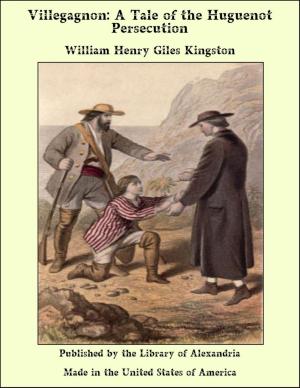Memoirs of the Generals: Commodores and other Commanders who Distinguished Themselves in the American Army and Navy During the Wars of the Revolution and 1812 and who were Presented with Medals by Congress for their Gallant Services
Nonfiction, Religion & Spirituality, New Age, History, Fiction & Literature| Author: | Thomas Wyatt | ISBN: | 9781465589941 |
| Publisher: | Library of Alexandria | Publication: | March 8, 2015 |
| Imprint: | Language: | English |
| Author: | Thomas Wyatt |
| ISBN: | 9781465589941 |
| Publisher: | Library of Alexandria |
| Publication: | March 8, 2015 |
| Imprint: | |
| Language: | English |
Among those patriots who have a claim to our veneration, George Washington claims a conspicuous place in the first rank. The ancestors of this extraordinary man were among the first settlers in America; they had emigrated from England, and settled in Westmoreland county, Virginia. George Washington, the subject of these memoirs, was born on the 22d February, 1732. At the time our hero was born, all the planters throughout this county were his relations—hence his youthful years glided away in all the pleasing gayety of social friendship. In the tenth year of his age he lost an excellent father, who died in 1742, and the patrimonial estate devolved to an elder brother. This young gentleman had been an officer in the colonial troops, sent in the expedition against Carthagena. On his return, he called the family mansion Mount Vernon, in honor of the British admiral with whom he sailed. George Washington, when only fifteen years of age, ardent to serve his country, then at war with France and Spain, solicited the post of midshipman in the British navy, but the interference of a fond mother suspended, and for ever diverted him from the navy. His devoted parent lived to see him acquire higher honors than he ever could have obtained as a naval officer; but elevated to the first offices, both civil and military, in the gift of his country. She, from long established habits, would often regret the side her son had taken in the controversy between her king and her country. The first proof that he gave of his propensity to arms, was in the year 1751, when the office of adjutant-general of the Virginia militia became vacant by the death of his brother, and Mount Vernon, with other estates, came into his possession. Washington, in his twentieth year, was made major of one of the militia corps of Virginia. The population made it expedient to form three divisions. When he was but just twenty-one, he was employed by the government of his native colony, in an enterprise which required the prudence of age as well as the vigor of youth. In the year 1753, the encroachments of the French upon the western boundaries of the British colonies, excited such general alarm in Virginia, that Governor Dinwiddie deputed Washington to ascertain the truth of these rumors; he also was empowered to enter into a treaty with the Indians, and remonstrate with the French upon their proceedings. On his arrival at the back settlements, he found the colonists in a very unhappy situation, from the depredations of the Indians, who were incessantly instigated by the French to the commission of continual aggressions. He found that the French had actually established posts within the boundaries of Virginia. Washington strongly remonstrated against such acts of hostility, and in the name of his executive, warned the French to desist from those incursions. On his return, his report to the governor was published, and evinced that he had performed this honorable mission with great prudence.
Among those patriots who have a claim to our veneration, George Washington claims a conspicuous place in the first rank. The ancestors of this extraordinary man were among the first settlers in America; they had emigrated from England, and settled in Westmoreland county, Virginia. George Washington, the subject of these memoirs, was born on the 22d February, 1732. At the time our hero was born, all the planters throughout this county were his relations—hence his youthful years glided away in all the pleasing gayety of social friendship. In the tenth year of his age he lost an excellent father, who died in 1742, and the patrimonial estate devolved to an elder brother. This young gentleman had been an officer in the colonial troops, sent in the expedition against Carthagena. On his return, he called the family mansion Mount Vernon, in honor of the British admiral with whom he sailed. George Washington, when only fifteen years of age, ardent to serve his country, then at war with France and Spain, solicited the post of midshipman in the British navy, but the interference of a fond mother suspended, and for ever diverted him from the navy. His devoted parent lived to see him acquire higher honors than he ever could have obtained as a naval officer; but elevated to the first offices, both civil and military, in the gift of his country. She, from long established habits, would often regret the side her son had taken in the controversy between her king and her country. The first proof that he gave of his propensity to arms, was in the year 1751, when the office of adjutant-general of the Virginia militia became vacant by the death of his brother, and Mount Vernon, with other estates, came into his possession. Washington, in his twentieth year, was made major of one of the militia corps of Virginia. The population made it expedient to form three divisions. When he was but just twenty-one, he was employed by the government of his native colony, in an enterprise which required the prudence of age as well as the vigor of youth. In the year 1753, the encroachments of the French upon the western boundaries of the British colonies, excited such general alarm in Virginia, that Governor Dinwiddie deputed Washington to ascertain the truth of these rumors; he also was empowered to enter into a treaty with the Indians, and remonstrate with the French upon their proceedings. On his arrival at the back settlements, he found the colonists in a very unhappy situation, from the depredations of the Indians, who were incessantly instigated by the French to the commission of continual aggressions. He found that the French had actually established posts within the boundaries of Virginia. Washington strongly remonstrated against such acts of hostility, and in the name of his executive, warned the French to desist from those incursions. On his return, his report to the governor was published, and evinced that he had performed this honorable mission with great prudence.















